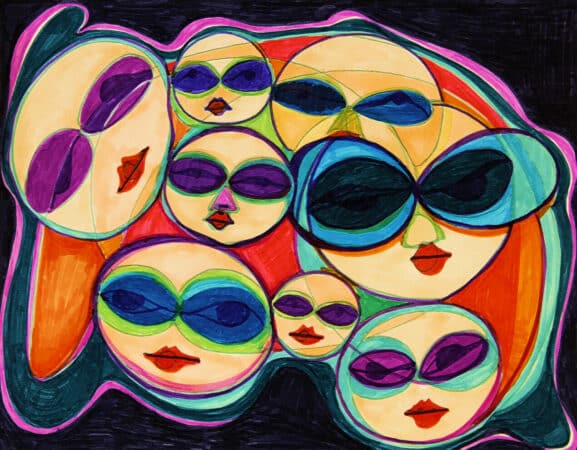Irlen Syndrome (IS), also known as Scotopic Sensitivity Syndrome, is something of a controversial condition that is claimed to be more prevalent among autistic people.
What is Irlen Syndrome?
Irlen Syndrome has been described as a perceptual processing issue that impacts the way the brain processes visual information (Miyasaka, Vieira, Novalo-Goto, Montagna, & Wajnsztejn, 2019). Irlen Syndrome is said to manifest in various visual alterations, including sensitivity to brightness, poor adaptation to colour contrasts (light and dark), moving or blurring letters while reading, cloudiness around the edges of one’s vision, difficulty holding one’s eyes on a target, and changes in depth perception. Some of the listed symptoms of Irlen Syndrome include poor reading ability, headaches or migraines, problems with depth perception, light sensitivity, eyestrain and fatigue, and problems with attention and concentration. The exact cause of Irlen syndrome is unknown, however some hypothesize that it is associated with deficits in the magnocellular system, or that it possibly has a genetic component.
However, controversy surrounds the diagnosis of Irlen Syndrome. There is disagreement on whether Irlen Syndrome actually exists, and if it does exist; does it exist as a distinct diagnostic entity, or are the symptoms better explained as part of another disorder?
This following position is held by The Royal Australian and New Zealand College of Ophthalmologists (RANZCO). They released a statement in 2018 stating that there is no good quality evidence that Irlen Syndrome exists, stating that:
“Despite Irlen Syndrome being first described in the early 1980s, there is still no sound theoretical basis or evidence that the condition actually exists. A diagnosis of Irlen Syndrome is based solely on symptoms with no quantitative physiological correlation…”
Furthermore, Irlen Syndrome is also not recognised by the majority of the medical community, including the World Health Organisation, the American Academy of Ophthalmology, the American Academy of Pediatrics, the American Association for Pediatric Ophthalmology and Strabismus, and the American Association of Certified Orthoptists.
Irlen lenses
The controversy also extends to the only known ‘treatment’ of Irlen Syndrome, known as Irlen lenses. Irlen lenses are specially tinted lenses or filters that supposedly reduce the visual distortions and other symptoms associated with the syndrome. This is proposed to work by reducing the contrast between light and dark, making for easier retinal photoreceptor adaptation. This should theoretically improve reading comprehension, reduce fatigue, give a better sensation of depth, and help with attention.
A systematic review of 44 articles on Irlen Syndrome published between 1989 and 2018 showed mixed results, with many studies showing strong selection bias in participant recruitment and dubious instrument validity and study design (Miyasaka et al., 2019). Fourteen of the studies found weak evidence supportive of filtered lenses, 14 of the studies did not find evidence that filtered lenses were effective, five studies were inclusive, and four studies suggested more studies needed to be carried out before any conclusions could be drawn.
The authors of the systematic review concluded that despite the 30 years of mixed-quality evidence, they cannot say definitively that Irlen Syndrome and its symptoms do not exist, but that the screening and diagnostic tests are of questionable quality. Furthermore, they stated that the prescription of coloured lenses as a treatment should not be recommended due to poor quality evidence, and that any benefits ascribed to this treatment method are likely due to a placebo effect, or due to a practice effect with regards to reading improvements.
The Royal Australia and NZ College of Opthalmologist have made a strong statement on the use of Irlen lenses,
“Overwhelmingly the research shows no benefit from this treatment in children with reading difficulties and vulnerable parents are being exploited and having their children subjected to unnecessary screening practices.”
Putting aside the controversy around Irlen Syndrome, it is claimed by Irlen organisations that autistic children have higher rates of IS than the neurotypical population.
Is Irlen Syndrome more common for autistic children?
Estimates from Irlen organisations speculate that a high number of autistic children also have Irlen Syndrome and that this pairing is more common than for the neurotypical population, however the sources for these claims are often not cited. When researching this topic, I performed a search for peer-reviewed journal articles on Irlen Syndrome and autism and could not find prevalence rates based on studies with large sample sizes.
When performing a regular Google search on this topic, the first result that pops up is a guest article from the National Autistic Society, a UK-based website. The article was guest written by Tina Yates (2017), an Irlen diagnostician, who says Irlen Syndrome affects “well over half of autistic people” despite not citing a source for this number.
The Irlen Institution website, founded by Helen Irlen herself, makes no mention of the co-occurring Irlen Syndrome and Autism prevalence rates, and their page on Autism only provides links to two articles from 1990s. For something that supposedly affects over half of autistic people, it is concerning that they have no research from the past 20 years to cite in support of this.
Final thoughts
The symptoms of Irlen Syndrome seem to resonate with a lot of autistic people, however Irlen Syndrome as a diagnosis, the way in which it is diagnosed, and the proposed patented treatment, along with the general lack of quality evidence or support by major medical bodies is a cause of concern.
Beyond the above-mentioned diagnostic and treatment issues, it appears that the only people who are ‘qualified’ to make this diagnosis are people trained by the Irlen Institute. Coincidentally, they are also the only providers of the specially tinted glasses, and they go to great lengths to state that other tinted glasses will not work; they MUST be Irlen lenses. It was difficult to find an exact cost for all of this as most places in Aotearoa that offer Irlen testing do not list their prices upfront, but an Australian news article estimated the cost for visiting an Irlen diagnostician for a screening and leaving with a pair of lenses could cost around $700, without even accounting for the additional costs of follow up tests (Stevens, 2019).
Overall, while there may be some overlap between the symptoms of autism and Irlen Syndrome, the evidence for a strong relationship between the two conditions is limited and controversial, as is the legitimacy of the diagnosis and the treatment. There do not appear to be any risks to seeking a diagnosis or trying Irlen lenses if you are experiencing visual symptoms (beyond potentially losing time and money), but as it currently stands, this does not appear to be the best evidence-based practice.

Ashe-Yee
References
Miyasaka, J. D. S., Vieira, R. V. G., Novalo-Goto, E. S., Montagna, E., & Wajnsztejn, R. (2019). Irlen syndrome: systematic review and level of evidence analysis. Arquivos de Neuro-Psiquiatria, 77(3), 194-207.
Stevens, R. (June 26, 2019). Irlen syndrome, the condition medical experts say doesn’t exist, promoted to school teachers. Retrieved from the ABC News website: https://www.abc.net.au/news/2019-06-26/irlen-syndrome-medical-eye-condition-controversy/11218184
The Royal Australian and New Zealand College of Ophthalmologists. (24th April, 2018). Irlen syndrome. Retrieved from: https://ranzco.edu/wp-content/uploads/2018/11/Irlen-Syndrome-Position-Statement-May-2018.pdf
Yates, T. (March 16, 2017). Autism and Irlen syndrome. Retrieved from the National Autistic Society website: https://www.autism.org.uk/advice-and-guidance/professional-practice/irlen-syndrome#:~:text=Irlen%20syndrome%20is%20a%20difficulty,of%20the%20neuro-typical%20population



